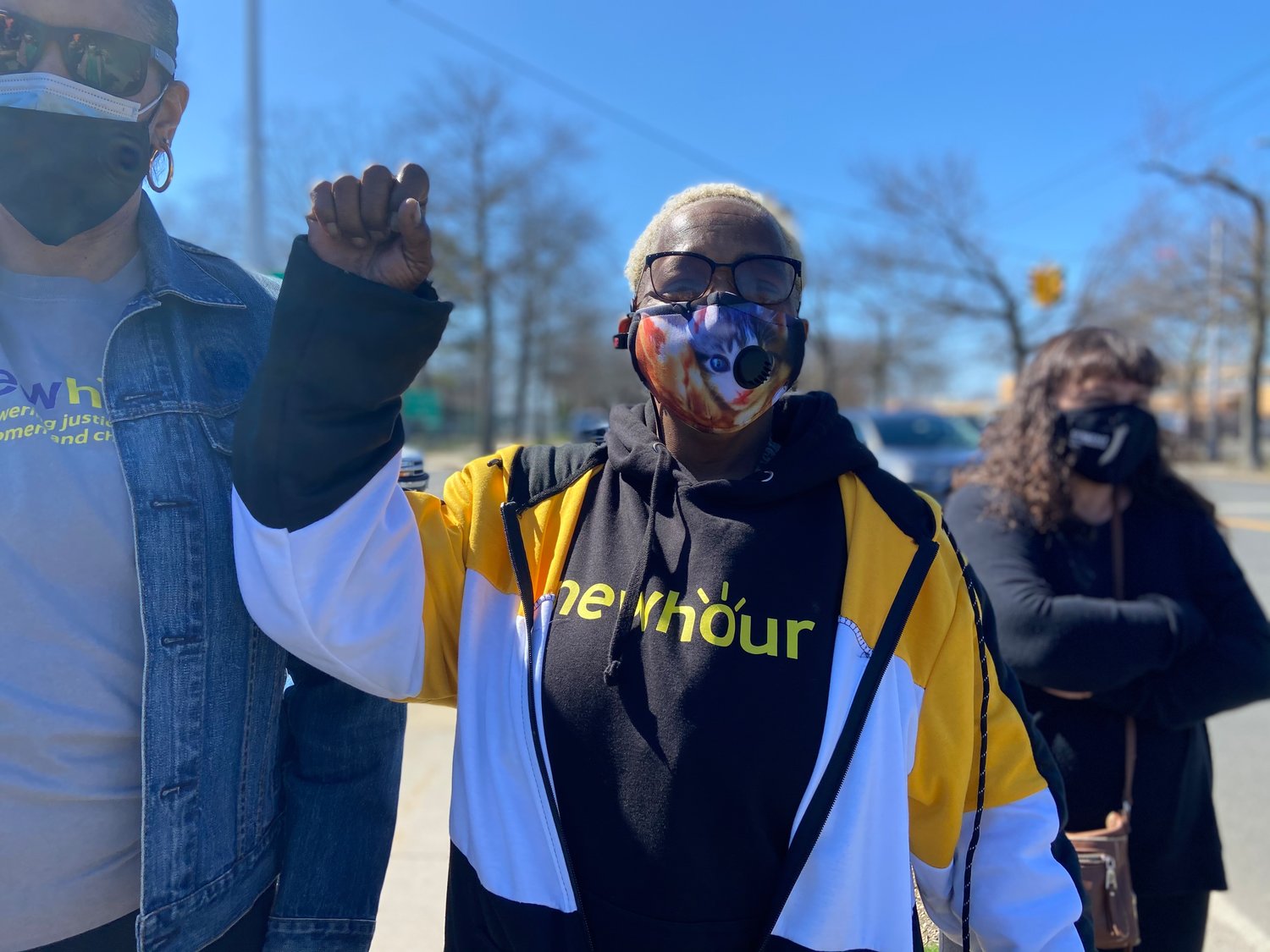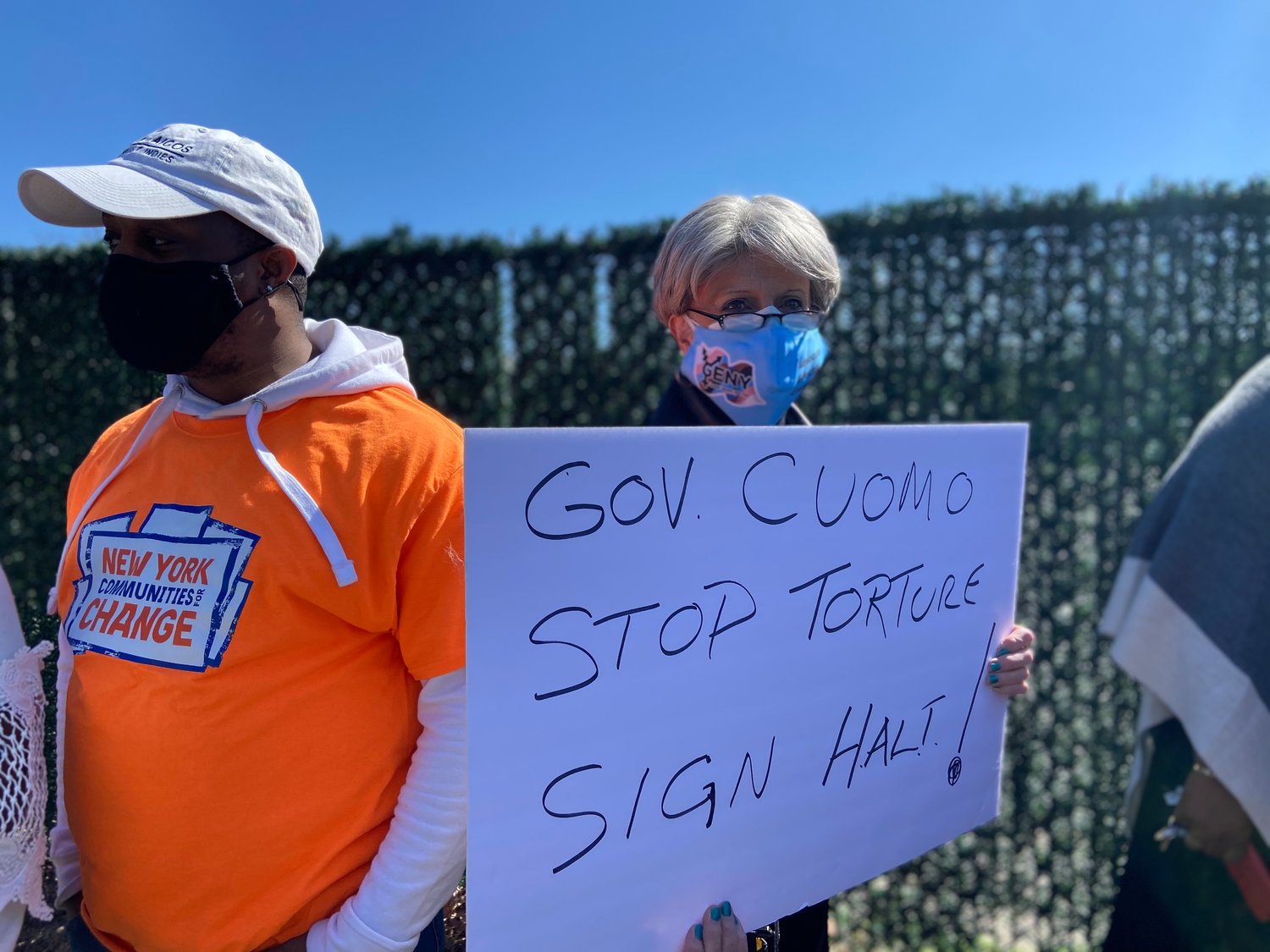Thursday, April 18, 2024
Protest at correctional center calls for state jail, prison reform
Cynthia Manuel, wearing a Release Aging People in Prison T-shirt, stood outside the Nassau County Correctional Center in East Meadow, where a member of her family is currently being held. A coronavirus policy is preventing her from going inside to visit her relative.
Inmate visitations were permitted last summer, but were canceled on Nov. 15, around the time that the state and Nassau County began seeing an increase in Covid-19 cases. On March 20, Sheriff James Dzurenda wrote in a public letter that two staff members and two inmates had tested positive. Dzurenda added that he planned to restore visits and outdoor activities “as soon as it’s safe.”
Using Centers for Disease Control and Prevention guidelines, safety measures are being set up to allow for scheduled attorney visits, Dzurenda stated in his letter, and if those protocols prove successful, the facility will begin limited, scheduled family visitation.
“The only way that our prison inmates are getting [Covid] is because it’s being brought in from the streets by [court officers] and anybody else that comes in,” Manuel said. “If they can go in and give the virus, why can’t we go in and wear masks and protect them? It’s really crazy.”
Enough is enough, she added. “We care — everyone should care.”
Manuel was among the advocates and family members of inmates gathered in front of the NCCC on March 30 to demand reform inside jails and prisons across the state. Their demands included vaccinating inmates for Covid-19, allowing visitors, establishing consequences for employees who refuse to wear masks and restricting solitary confinement.
Two days after the protest, Gov. Andrew Cuomo signed the HALT Solitary Confinement Act into law. It restricts the duration of such confinement in state correctional facilities to 15 days, and clearly defines and reduces the number of disciplinary infractions eligible for it. The law also exempts members of vulnerable populations, including the young, elderly, pregnant, disabled and mentally ill, from solitary confinement.
The legislation establishes “residential rehabilitation units” to provide inmates with therapeutic and trauma-informed programming in a group setting.
“The main demand is for all human beings to be treated humanely and with dignity,” Susan Gottehrer, director of the New York American Civil Liberties Union Nassau County Chapter, said. “Inside this jail, both the physical health and the mental health of human beings are being intentionally jeopardized, and until all these demands are met, this building represents the current abhorrent values of our society.”
A majority of the jail’s occupants have not been found guilty of a crime or sentenced, Pam Neely, Long Island Social Justice Action Network coordinator, pointed out. “When this epidemic started, we had to stay inside,” Neely said. “Everybody was going crazy. Imagine what they’re going through in there. Not knowing anything that’s going on out here. They deserve to be treated like human beings.”
Helen Matines, a member of a correctional center committee that manages the relationship between the jail and the surrounding community, said that as far she knows, the jail population is relatively low because of the state bail-reform law that took effect last year. “We haven’t had any updates,” Matines said. “We asked; we reached out. But because of the pandemic, we haven’t been able to get there yet. Hopefully soon.”
When it comes to vaccinating inmates to prevent the spread of infections, Dzurenda told Newsday that his staff began preparing for inoculations weeks ago, even before a Bronx judge ordered vaccines to be offered to incarcerated people on March 29. The facility is currently waiting on a supply of vaccines.
“So we need [County Executive] Laura Curran, the commissioner of health in Nassau County and the sheriff to hear us loud and clear,” Gottehrer said at the protest. “Vaccinate inside this jail now, right now.”
HELP SUPPORT LOCAL JOURNALISM
The worldwide pandemic has threatened many of the businesses you rely on every day, but don’t let it take away your source for local news. Now more than ever, we need your help to ensure nothing but the best in hyperlocal community journalism comes straight to you. Consider supporting the Herald with a small donation. It can be a one-time, or a monthly contribution, to help ensure we’re here through this crisis. To donate or for more information, click here.
Sponsored content
Other items that may interest you







